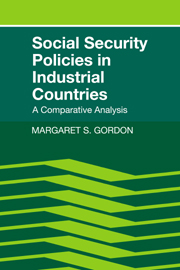Book contents
- Frontmatter
- Contents
- Preface
- Acknowledgments
- Abbreviations
- 1 Postwar developments
- 2 Differences in social security spending
- 3 National old-age pension programs: basic structure
- 4 Other major features of old-age pension programs
- 5 The age of retirement
- 6 Long-term invalidity programs
- 7 Industrial injuries programs
- 8 The role of employer pension plans
- 9 The economic impacts of pension programs
- 10 Health benefits
- 11 Unemployment compensation
- 12 Labor market policies
- 13 Family allowances and family policies
- 14 Public assistance and guaranteed income proposals
- 15 International linkages
- 16 Conclusions
- Appendix 1
- Appendix 2
- References
- Index
15 - International linkages
Published online by Cambridge University Press: 06 July 2010
- Frontmatter
- Contents
- Preface
- Acknowledgments
- Abbreviations
- 1 Postwar developments
- 2 Differences in social security spending
- 3 National old-age pension programs: basic structure
- 4 Other major features of old-age pension programs
- 5 The age of retirement
- 6 Long-term invalidity programs
- 7 Industrial injuries programs
- 8 The role of employer pension plans
- 9 The economic impacts of pension programs
- 10 Health benefits
- 11 Unemployment compensation
- 12 Labor market policies
- 13 Family allowances and family policies
- 14 Public assistance and guaranteed income proposals
- 15 International linkages
- 16 Conclusions
- Appendix 1
- Appendix 2
- References
- Index
Summary
Thus far we have been considering social security provisions on a country by country basis, with little reference to how those moving between countries might acquire social security rights or how the provisions of a given country might be affected by bilateral or multilateral agreements. On occasion, we have referred to ILO or ISSA reports and to the directive of the European Economic Community relating to equality of treatment of men and women in social security matters, but there is a broad field of international cooperation and agreements that has yet to be explored.
Over the course of the present century, there has developed a network of bilateral agreements, under which workers moving from one country to another may become eligible for benefits in the country to which they have moved, or in some cases may receive credit for contributions made to social security schemes in the country from which they have moved. Second, international organizations have developed regulations providing for the social security rights of migrant workers and for minimum social security standards that become effective in the countries ratifying them. The oldest and largest of these organizations is the ILO, dating from 1919 and including (as of 1983) 144 countries, or the vast majority of members of the United Nations. Also active in developing social security standards is the Council of Europe, dating from 1949 and including 22 European countries.
More recently the European Communities have become active in this field. They include the European Coal and Steel Community, dating from 1952, and the European Economic Community (EEC) or Common Market, established under the Treaty of Rome of 1957, which became effective in 1958.
- Type
- Chapter
- Information
- Social Security Policies in Industrial CountriesA Comparative Analysis, pp. 328 - 335Publisher: Cambridge University PressPrint publication year: 1989



